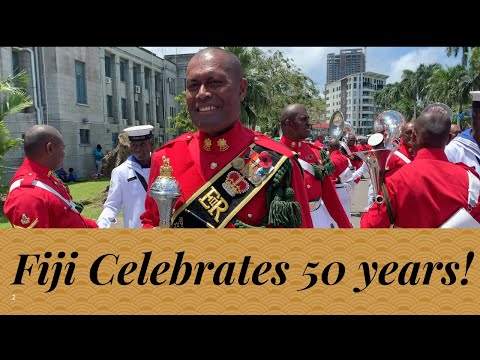Fiji Independence Day
On October 10, 1970, Fiji received official independence from British colonial control after 96 years of British domination. The Deed of Cession, which began British control in Fiji, was signed by King Seru Epenisa Cakobau on the same day in 1874. The loss of hegemony as well as independence are both honoured in Fiji. As a result, October 10 is recognised as a major day in the history of the nation and is celebrated for a whole week each year. There are celebrations in almost every town and city around the archipelago, including military parades, speeches, performances, and street parties.
In order to explore constitutional amendments with the goal of introducing responsible governance, a constitutional conference was organised in London in July 1965. (Delaibatiki, 2015). Indo-Fijians requested the rapid implementation of full self-government with a fully elected legislature that would be chosen by universal suffrage from a pool of voters under the leadership of A. D. Patel. The ethnic Fijian delegation vehemently opposed these requests because it remained concerned about losing control over resources and land owned by its people if an Indo-Fijian-dominated administration were to take office. But the British were clear that they were committed to helping Fiji achieve self-government and ultimately independence. The chiefs of Fiji made the decision to bargain for the best possible agreement after realising they had no other option.
Fiji Day Facts
Ratu Kamisese Mara served as the country’s first Chief Minister after concessions between the Indo-Fijian and ethnic delegates over the course of the next five years led to the establishment of a cabinet system of government in 1967.
Indigenous Fijians, who are those with Melanesian and Polynesian descent, Indo-Fijians, Chinese, and Europeans all have a place in the multicultural island country of Fiji.
In the area, Australia and New Zealand play crucial roles.
Fiji Week, the week preceding Fiji Day, is made up of a number of religious and cultural celebrations that highlight the variety of Fiji.
Kava, a beverage derived from the roots of the kava shrub, will be served at Fiji Day celebrations. Along with Fijian food, which is well-known worldwide for its traditional underground “lovo” pits, as well as Indian and Chinese spicy meals, tropical fruits, vegetables, fish, and wild hog, kava is a significant component of the celebrations.
A prime example of a youthful, hip Australian Indo-Fijian and Masterchef Australia champion in 2021 is Justin Narayan.
Only 110 of Fiji’s 322 islands and more than 500 tiny islets are inhabited, perhaps due to the islands’ rocky nature.
On Viti Levu (Great Fiji), the largest of the Islands, Suva is the major metropolis.

